- Home
- Lou Cameron
Piccadilly Doubles 2 Page 3
Piccadilly Doubles 2 Read online
Page 3
For a moment Rockwell seemed ready to shout at me, then his anger subsided and he smiled his mirthless smile.
“I said it and I meant it,” he said. “Your glorious flag is nothing but a filthy rag to me.”
I got another attack of patriotic fever and started to get up. “Hold on, Rockwell.”
Rockwell caught my arm and pushed me back in the chair. “You hold on, Mister Forbes. No one calls me ‘Rockwell,’ not even Brigham himself. You came here of your own accord. No one sent for you and your goddamned questions. Now you’re drunk and you’d better go to bed.”
I mumbled and at least got my tongue straight enough to say, “That’s a good idea, I think I will, Mr. Rockwell.”
He took the second bottle off the table and put it in his coat pocket.
“Call me Port,” he said.
I stuck out my hand, but instead of shaking it he pulled me to my feet.
“And you call me William or Bill,” I said. “We must have a talk tomorrow.”
“What do you think we’ve been having?” Rockwell said.
Chapter Three
On the morning after, I felt like the virgin who awakens in the sporting gentleman’s quarters and realizes that she’s been had. I was in my bed at the hotel and my boots and coat and tie had been removed the night before. Nothing much was in my head except a blinding pain, then the events of the previous day and evening drifted back into my consciousness.
Porter Rockwell had put me to bed after I talked nonsense for hours and made a feeble attempt to punch him in the nose for reviling Old Glory. I remembered that he asked me to call him Port, so it seemed that I had passed the test. The next interview with Rockwell, if there was one, would determine if I was right. But what he thought of me didn’t seem so terribly important at the moment. I shuddered at the thought of food, yet food was what I needed. And coffee, plenty of strong black coffee.
The day before had been strange; what was to come would be stranger still. Less than twenty-four hours had passed, but I was certain that half of Salt Lake City knew my name and what I was there to do.
Getting up shakily, I went to the wash basin and splashed water on my face and rubbed it around the back of my neck. In the mirror my jaw was stubbled, my eyes streaked with red. I was still staring at myself with distaste when a knock came at the door. At first I ignored it. Then it came again with greater force, and when I said, “Come in,” it was Rockwell who entered, looking as if he’d gone to bed sober and gotten up feeling fine.
“I’ve ordered breakfast for both of us,” he informed me. “You’re one of those men that shouldn’t drink, William.”
That was what he called me: William. It was all he ever called me during our long association.
“Thanks for getting me to bed.”
“You walked most of the way with a little help.” He picked up my coat and handed it to me. “Get a move on. If you don’t mind cold food, I do. After we eat we’ll take a walk around the city. You can shave later. You don’t want to shave with shaky hands.”
The clock in the restaurant off the lobby said it was 6:15, but even at that ungodly hour the place was more than half filled. The girl who brought in the food looked like a Mormon, or rather, she looked like my idea of a Mormon: a shapeless gray dress with a chaste high collar, a saucepan-shaped cap perched on top of her clean blond hair. Like the boy in the saloon, she spoke in a familiar way to Rockwell, addressing him as “Port.”
“This is William Forbes from New York,” Rockwell said.
The girls name was Abby Brimmer and she nodded to me without smiling. Pretty as a picture, as they say, she was about the most serious-looking girl I’d seen in my life.
“It’s a pleasure to meet you, William,” she said before she went away.
No wonder so many Mormons were built like rain barrels; the breakfast was immense. Steak and fried eggs, fresh fruit and oatmeal, bread that smelled as if it had just been baked. The coffee was just as good as everything else, but I noticed that Rockwell wasn’t drinking any of it. His drink this morning was milk with thick cream floating on top. A whole pitcher of it.
He saw me looking at the milk. “We’re not supposed to drink coffee,” he said.
“I thought you weren’t supposed to drink whiskey.”
“Or rum or anything else. Some of us sin and have to ask forgiveness. I’m afraid I sin a lot, William, so I have to ask many times for forgiveness. I’ll bet you don’t get a breakfast like this in New York.”
“We don’t,” I admitted, pleased to find that I was hungry in spite of my fluttering stomach. After I drank the first cup of coffee I ate as heartily as everyone else in the dining room. I knew Rockwell wanted to show me the sunny side of Mormon life, but I wasn’t there to write glowing articles for the Chamber of Commerce. Yet I was impressed by some of the things I’d seen: the well-planned city that seemed to be free of the reeking slums of the East, the rude good health of the Mormons I’d seen in the street, and now, the food.
“What did you decide about me?” I asked Rockwell.
“Don’t rush everything, William. Life moves at a slower pace here. We work hard but we’re not frantic about it. But I guess you won’t be here long enough to learn our ways.”
“You asking me how long I’ll be in Utah, Port?”
“That I am, William.”
“The man I work for says I can stay as long as I like.”
“Then why don’t you make yourself at home and write about what’s real and good here?”
“Then you’ve decided about me?” I prompted him. “Do I pass the test?”
Rockwell drank milk with as much gusto as whiskey. So far he’d put away half a pitcher. “Let me say that I trust you for now. If you don’t do anything to change that I’ll trust you more. I’ll tell you things about me, if that’s what you want, but not about others. I won’t tell you anything that will endanger my church or my people. That’s the way it will have to be.”
I nodded acceptance of his terms. “Is it all right if I ask questions on my own?”
“Don’t ask too many questions,” Rockwell warned, his pale eyes flickering. “Not at first anyway. Ask too many questions and people will put you down as a government spy.”
“Are there government agents here?”
“They’re here but we don’t know who they are. Not yet.”
Once again I felt the menace of Porter Rockwell, the absolute dedication to his church. In Utah the church and the people were inseparable; there was no need to distinguish one from the other. His was the faith of the fanatic, the zealot completely without doubts as to the rightness of his cause, the quiet man who could be roused to terrible anger. I wanted to ask about his unshakable loyalty to Brigham Young, the father of them all, the holy man who saw nothing incongruous in the acquisition of great wealth. Still, whatever he was, for all the crimes with which he had been charged, he had led them to freedom, and they had prospered under his rule. Rockwell seemed to trust Brigham Young as he trusted no man on earth, and I wondered how much that trust was deserved and what would happen if that trust were ever broken.
“Let’s take that stroll so the girl can get on with her work,” Rockwell said, finishing the last of the milk. The other diners looked at us as we went out.
The hotel was on a hilly street and from where we were, standing in the bright sunlight, it was possible to see far into the great valley, across the roofs of the dwelling houses and commercial buildings, to the Great Salt Lake.
“Look at our city, at our valley,” Rockwell said with immense pride of ownership, as if he didn’t know that a good part of it belonged to Brigham Young. “Everything grows here, everything flourishes. It wasn’t always like that, I can tell you. When we first got here fourteen years ago the ground was so hard and dry it broke our plows. We diverted streams from the mountains and put in our first crop. Then came the crickets and threatened to destroy everything we had worked for. It looked like famine, but Brigham said the Lord wo
uld come to our aid. He was firm in this, as he is firm in everything. The cowards and doubters among us were howling in panic when over the mountains yonder”—he pointed—“came flocks of seagulls so great that they darkened the sky. They ate every last cricket. If that is not a miracle, then what is?”
I didn’t know what to say since I don’t believe in miracles. “Those gulls were a long way from the sea,” I ventured.
“It was a miracle,” Rockwell stated with the gravity of a bishop. Indeed, he was a bishop, albeit a minor one, but I didn’t know that at the time. “Everything here is a miracle. When we first crossed the mountains and I saw this valley I had doubts myself. Some of the elders went to Brigham and said we must push on to California where the land was fertile and green in the country to the north. In California, it was said, you could drop a seed on the ground and it grew by itself. But Brigham refused, saying, ‘This is the place.’ And it was the place. If we can do all this in fourteen years, think what we can do in fifty, in a hundred. And yet we were willing to burn our city to destroy our crops when the Americans came to put down our rebellion”—Rockwell spat out the word ‘rebellion’—“three years ago.”
The idea appalled me so much that I exclaimed, “You would have destroyed everything?”
Rockwell said, ‘What can be destroyed can be rebuilt. We would have gone far into the mountains, to hidden valleys where we had stores of food and weapons. And when the Americans found nothing but the smoldering earth they would have gone away and we would have returned to begin again. And if they came again we would have done the same thing until they were sick of the sight of us.”
I knew Rockwell was talking for publication, as they say, and I would use only some of what he said, knowing the temper of my own people, now faced with the greatest war in their history. There had to be a balance to all the pious, angry words. The diehards in the South had hurled the same defiant words at the North, unwilling to believe that “a nation of mechanics and city scum” would take up the challenge. But it had, and now the South was doomed no matter how the war was going. The Union would rouse itself; it might take years to turn the tide. Nevertheless, it would be done. And the Mormons, for all their pride and religious fervor, could be destroyed just as surely.
I said none of this to Rockwell, although I was sorely tempted to speak out; to tell him what the Mormons faced if it came to open rebellion. It would not have done the slightest good to tell him that tens of thousands of half-starved Irishmen were pouring off the immigrant ships and going directly into the Union Army. These men would fight Rebels, Mormons, Mexicans, anybody, for food and a few dollars a month.
Perhaps sensing my disapproval of his words, Rockwell changed the subject and was talking about his family. I asked him what he thought of polygamy since he himself had only one wife.
“Never saw the need of more than one wife at a time,” he said. “But it’s encouraged by our church and it’s not for me to go against it. Other women don’t mind too much—and some like it because it makes for less work—but my woman would break my head if I started fetching strange ladies to the house. It’s a useful thing just the same. Keeps up the population, makes us strong. Our first crop of boys born here will be men in a few years. It’s good for the women in other ways. We’re not like the American settlements where women are scarce and can pick and choose. Here we got more women than men, so some of them couldn’t find a husband if some man with a wife already didn’t marry her. We got some fine-looking women here, most of them from England, Germany, and Sweden. Men I’ve talked to swear the Swedes make the best wives. You’d have to ask them about that. My woman was born in the States.”
We were walking down the hill from the hotel. Now and then a man tipped his hat to Rockwell, who replied to all with a cheery wave of his left hand. I noticed that his right hand seldom strayed far from the gun pocket containing the sawed-off Colt.
“That girl at the hotel,” I said. “Abby wasn’t it? She’s old enough to be married. Is she?”
“It’s time she was married,” Rockwell said. “It’s past time. But she’s an odd one. Years back Brigham would have given her to some man or married her himself. She’s pretty enough for any man to marry. And plenty strong, a willing worker. But the elders let her be. I don’t know what kind of a man she’s looking for. She’s had plenty of offers, farmers, ranchers, men in business. But none of them suit her, so she waits on tables. Of course the hotel is church owned, and that takes some of the harm out of it. You fancy her, William?”
“No, I was just curious about her.”
Rockwell nodded. “However you fancy her, don’t touch her. There’s men that want her would kill you if you did.”
“Are they Mormons?”
“What else would they be? Gentiles know better than to bother our women.”
“Even if the women want to be bothered?”
“What they want makes no difference. If they don’t want to marry they can work for a family or if they know dressmaking they can do that. Or they can do what Abby Brimmer does. There’s a man—no names—that wants Brigham to force her to marry him though he’s got ten wives already. Brigham would like to do it as a favor, but with these government spies sneaking about he doesn’t want to be accused of slaving.”
Rockwell took a gold watch from his pocket and looked at it. “We got to shake a leg, William. We been talking and the time slipped by.”
“What do you have to do?”
Rockwell didn’t break his stride or even look at me. “I got to shoot a boy this morning. Or what I mean, I got to arrange to have him shot.”
He had shorter legs than I did; still I had to stretch to keep up with him. “I thought you weren’t the sheriff anymore.”
“Never was a full-time sheriff, county or any kind. I work my ranch and a few other businesses and when there’s sheriff work to be done they call for me. In turn, I got men I can deputize. But you might say I’m the law in Salt Lake and thereabouts. I’ll tell you about the boy I got to shoot when we get to the jail.”
The jail was a cut-stone two-story building with an iron door and a high wall enclosing the back of it. The wall had spikes on the top. No jail is pleasant to look at; this one was truly sinister, for it wasn’t simply a jail but a stronghold of political power. I felt sure that more than a few men had died there, and not by legal execution.
We went into the jail and three men with rifles were waiting in Rockwell’s office. They were Mormons, stolid men in black clothes and uncreased hats. They might have been Pennsylvania Dutch farmers if not for the hardness in their eyes. Their rifles were 1852 Enfields, .577 caliber, and must have been the property of the U.S. Army at some point.
“Did my deputy find a Gentile parson for the boy?” Rockwell asked one of them, a big elderly man with a face even more solemn than the others’.
“He found him,” the man answered. “Doc Whittaker’s in there too, getting him to sign papers saying it’s legal for him to take his body and cut it up.”
“Doc’s paying the boy a pound of hard candy for his body,” Rockwell said to me.
I must have grunted something. What was there to say to something like that?
Rockwell turned back to the three executioners. “Then you men get out and set up the chair. Joseph will give me a whistle when the parson’s done praying over the boy.”
They went out through the cells to the yard.
Rockwell asked me if I’d ever witnessed an execution. “By the look on your face I see you haven’t. Well, this boy has to be shot, and there’s no two ways about it. Feebleminded he may be, but he has to be killed as a lesson to others. His name is Chauncey W. Millard and he murdered a good Mormon—Harlem P. Swett—that gave him a job as a teamster at his mine. Shot Harlem just to steal a few jars of honey, wounded his partner, another good Mormon. The murder happened on the west shore of Utah Lake. The wounded man got away, swam the lake and people brought him to me. By then the murdering half-wit was long gone and I h
ad to track him clear across the mountains to Rush Valley, where I found him working for a sheepherding outfit. I brought him back and here he is.”
Rockwell found his sheriff’s badge and pinned it on his shirt. I suppose that was to make it official.
I heard a cell door slam on the second floor of the jail. “But why execute him if he’s an idiot?”
Rockwell appeared surprised. “He shot two Mormons. I just told you.”
“Did he get a trial?”
“He got one from me. A plain case of murder like that doesn’t need a court. You may as well know right now that I’m not much for taking prisoners. It’s just that I felt sorry for the boy and thought he should have some religious consolation before I killed him.”
“Did he make a confession?” I asked, horrified by the offhand manner of the man.
Rockwell said, “By the time I caught him he didn’t know who he had killed. The other man said it was him.”
Boots came down the iron stairs and there was a shrill whistle. “They’re ready” Rockwell told me. “You want to see Mormon justice. Well, here it is.”
I followed him out to the yard where the jail keeper was strapping a dull-eyed boy of about eighteen into a high-backed chair that stood against the back wall. Behind the chair was a sheet of planking to prevent the bullets from ricocheting if they missed the body and the chair. The leather straps went around the boy’s chest and legs; the jail keeper had left his arms free so he could eat the candy. He ate it fast, crunching it between discolored teeth, ignoring the three executioners who stood waiting without impatience. The doctor— Doc Whittaker—stood behind the executioners, tapping his fingernails on his teeth. When we came out he smiled at Rockwell and said, “A whole pound of candy at one time.”
“Shut up, Doc,” Rockwell said irritably. “You’ll have what you want in a minute.”
Now the idiot’s fingers were groping in the bottom of the empty bag; there was a distressed look on his face. It turned to sullen rage as the bag fell to the ground.
“Ready. Aim. Fire!” Rockwell said.

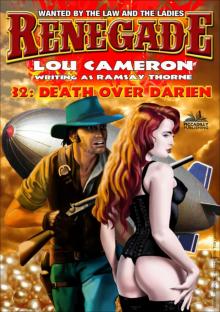 Renegade 32
Renegade 32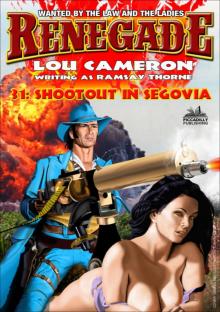 Renegade 31
Renegade 31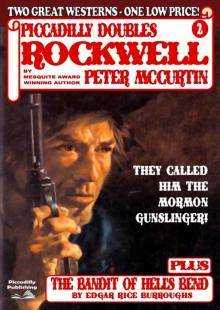 Piccadilly Doubles 2
Piccadilly Doubles 2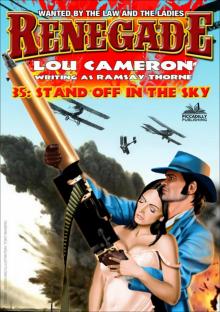 Renegade 35
Renegade 35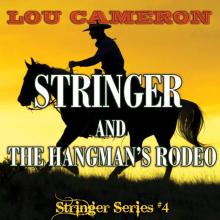 Stringer and the Hangman's Rodeo
Stringer and the Hangman's Rodeo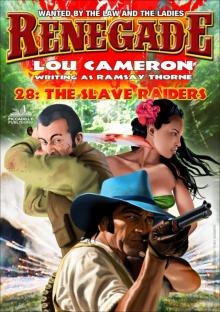 Renegade 28
Renegade 28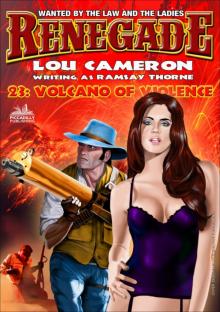 Renegade 23
Renegade 23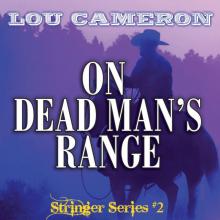 On Dead Man's Range
On Dead Man's Range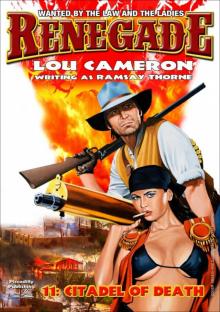 Citadel of Death (A Captain Gringo Western Book 11)
Citadel of Death (A Captain Gringo Western Book 11)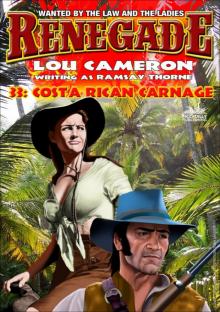 Renegade 33
Renegade 33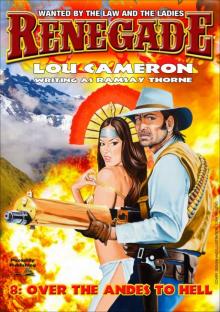 Over the Andes to Hell (A Captain Gringo Western Book 8)
Over the Andes to Hell (A Captain Gringo Western Book 8)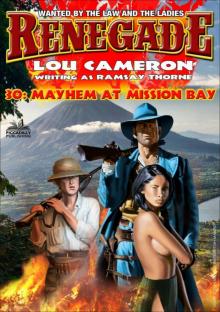 Renegade 30
Renegade 30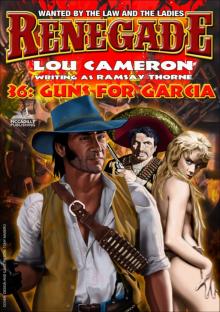 Renegade 36
Renegade 36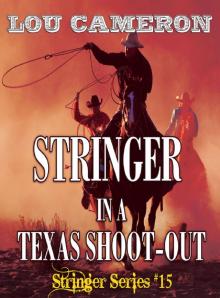 Stringer in a Texas Shoot-Out
Stringer in a Texas Shoot-Out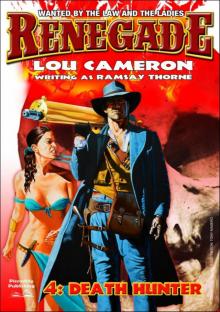 The Death Hunter
The Death Hunter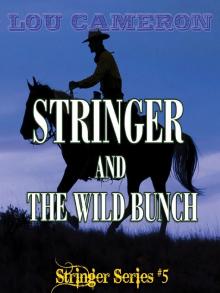 Stringer and the Wild Bunch
Stringer and the Wild Bunch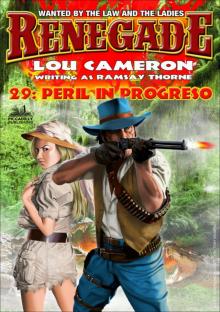 Renegade 29
Renegade 29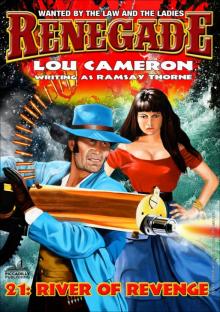 Renegade 21
Renegade 21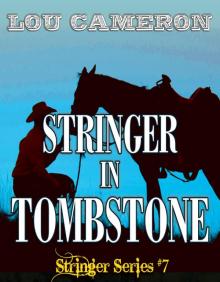 Stringer in Tombstone
Stringer in Tombstone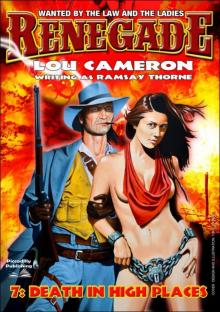 Death in High Places (A Renegade Western Book 7)
Death in High Places (A Renegade Western Book 7)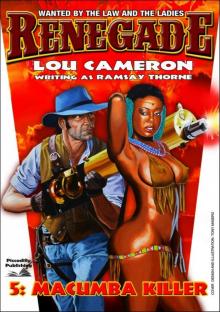 Macumba Killer
Macumba Killer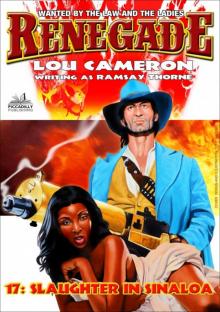 Renegade 17
Renegade 17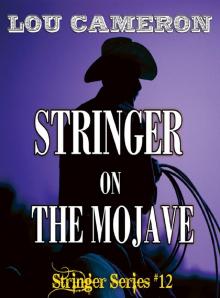 Stringer on the Mojave
Stringer on the Mojave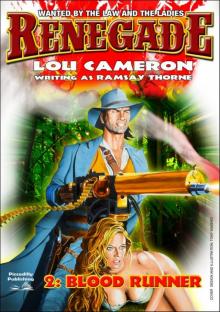 Blood Runner
Blood Runner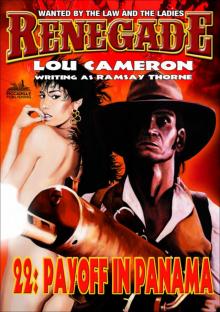 Renegade 22
Renegade 22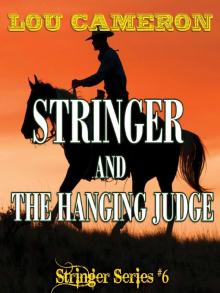 Stringer and the Hanging Judge
Stringer and the Hanging Judge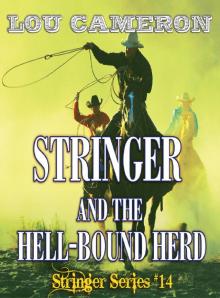 Stringer and the Hell-Bound Herd
Stringer and the Hell-Bound Herd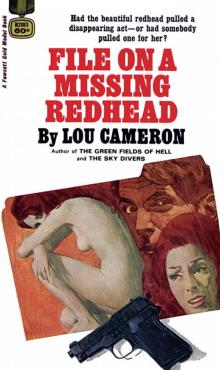 File on a Missing Redhead
File on a Missing Redhead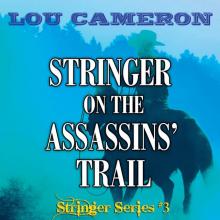 Stringer on the Assassins' Trail
Stringer on the Assassins' Trail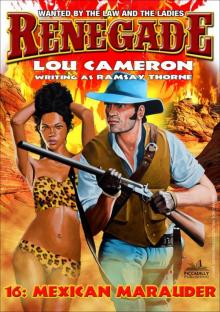 Mexican Marauder (A Captain Gringo Adventure #16)
Mexican Marauder (A Captain Gringo Adventure #16)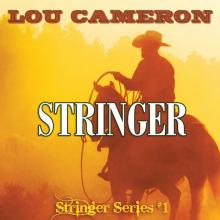 Stringer
Stringer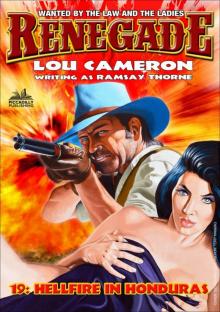 Renegade 19
Renegade 19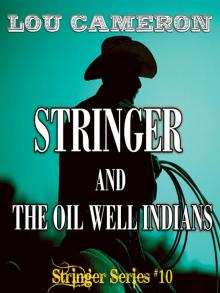 Stringer and the Oil Well Indians
Stringer and the Oil Well Indians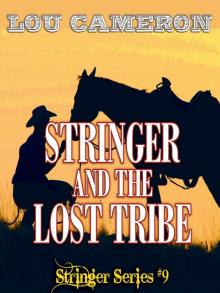 Stringer and the Lost Tribe
Stringer and the Lost Tribe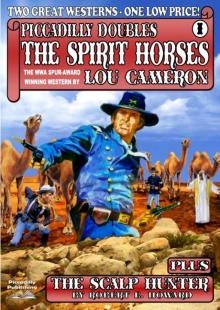 Piccadilly Doubles 1
Piccadilly Doubles 1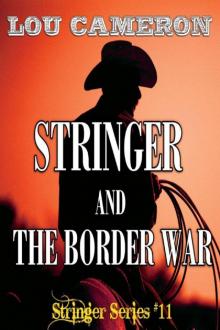 Stringer and the Border War
Stringer and the Border War Renegade
Renegade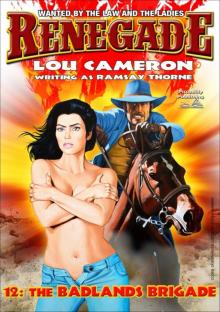 The Badlands Brigade (A Captain Gringo Adventure Book 12)
The Badlands Brigade (A Captain Gringo Adventure Book 12)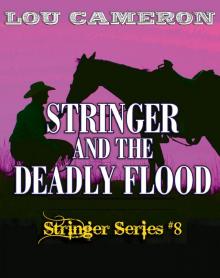 Stringer and the Deadly Flood
Stringer and the Deadly Flood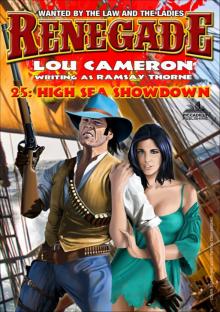 Renegade 25
Renegade 25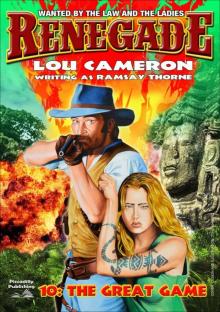 The Great Game (A Captain Gringo Western Book 10)
The Great Game (A Captain Gringo Western Book 10)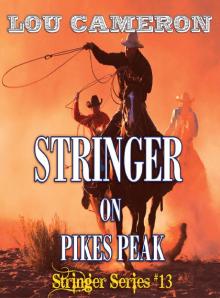 Stringer on Pikes Peak
Stringer on Pikes Peak